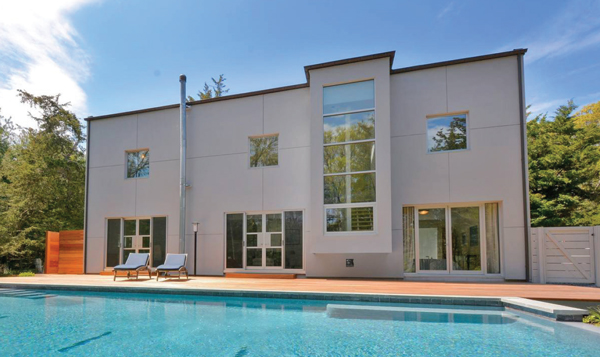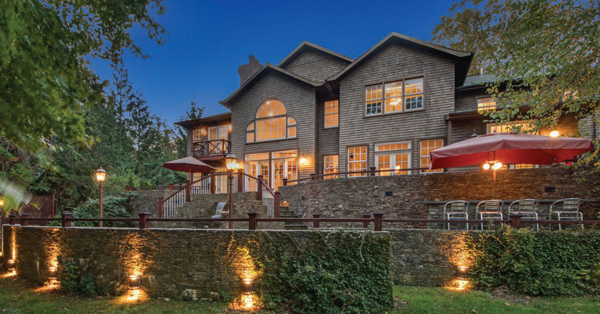A year ago, the East Hampton real estate market was awash in fears that the crackdown on Airbnb and other similar sites would upend the increasingly tepid luxury rental scene, with one top broker calling the policing a “creeping tyranny.”
But while the Hamptons rental market remains cool even as summer heats up, brokers say that the restrictions — which arrived in the form of rental registries, new taxes and bans on short-term stays — have not wrought the kind of havoc they had feared. Although some say that having rules in place and being enforced has helped mitigate the rowdy behavior they believe was proliferating due to Airbnb and its ilk, most say the impact of those stricter regulations on the market seems negligible.
“It really hasn’t taken that big of a bite out of the rental market this season,” said Gene Stillwell, a manager with Town and Country Real Estate in East Hampton.
Though Stillwell admits he’s most familiar with owners who use real estate agents to rent their homes and not those who turn to online services like Airbnb — a big chunk of the market — he added that his firm’s clients seem okay with the regulatory efforts.
“There’s a sense that they will make the Hamptons a safer place for a lot of people,” he said.
Since there are no major reports that analyze the rental market, assessing its health in any meaningful way — especially from year to year — is difficult, brokers say. But as of mid-June, only about half of the possible rentals in Bridgehampton, for instance, had been leased — a low number, said Christopher Burnside, an associate broker with Brown Harris Stevens. East Hampton had a similar percentage, said Burnside, who used his firm’s internal data for his analysis. (Read our story on the rental market on page 14.)
 The area has been stuck with that ratio for a couple of seasons, which brokers attribute to an erosion of the seasonal rental market by Airbnb, VRBO and other services that promote shorter-term stays — not the enforcement surrounding these sites.
The area has been stuck with that ratio for a couple of seasons, which brokers attribute to an erosion of the seasonal rental market by Airbnb, VRBO and other services that promote shorter-term stays — not the enforcement surrounding these sites.
Even if the rental registry rules — which require seasonal landlords to fill out paperwork for all rental stays and make sure their properties are up to code, among other things — aren’t loved, there does seem to be acceptance of them.
From May 1, 2016, when the registry rule went into effect, to the end of the year, 3,198 houses in East Hampton — which includes the party-inclined hamlet of Montauk — signed up to be rentals, according to David Betts, the town’s public safety director.
And in 2017, through early June, another 396 houses registered, said Betts, who was unable to pinpoint the total number of rental houses in the town, since there was no real way of counting them before the registry. Registrations are good for two years.
Tough rules were already on the books in East Hampton before 2016. As per an update in the zoning code in 1984, owners can to rent their homes for less than two weeks only twice every six months, making it tough for them to regularly cater to the Airbnb summer weekenders. Another rule is that no house can host more than four unrelated adults.
Still, the registry “has put houses on our radar, and is a very quick reference for us about how many people should be in there,” Betts said.
“Are we still getting calls about loud houses? To some extent, yes,” he added. “Is it effective? Is it working? Yes.”
East Hampton has moved against those who have failed to register. Officials initiated cases involving 70 properties in 2016, town records show. Many cases came to light after officials scoured sites like Airbnb, HomeAway and Craigslist, where ads are supposed to have visible registration numbers.
More broadly, there were 272 general housing investigations in 2016, up from 253 in 2015, records show, an increase that Betts partly attributes to the year-old registry law.
Other officials agree. The registry influenced the high-profile bust of a crowded summer share in Montauk last season, according to town attorney Michael Sendlenski. In the incident, which took place over Labor Day weekend, authorities arrested 18 people they said were living in a shingle-sided house at 13 Beech Hollow Court. It was permitted to have four bedrooms, officials say, but actually had nine, including one in a breakfast nook.
The house was registered with the town as a rental, which prompted officials to keep tabs on it. But the owner, Thomas Mahl, had not updated officials about the number of tenants in his house, as the registry law requires, Sendlenski said. The case against Mahl is still pending.

This three-bedroom in East Hampton is available for $1,000 a night on Airbnb.
Even more serious charges were brought against Alina Gersham, the tenant accused of being the ringleader of the summer share. Officials say she rented bedrooms for $1,800 per weekend. Ultimately, Gersham paid a $20,000 fine, Sendlenski said.
The house is now on the market. In early June, the property, which has a pool, hot tub and outdoor fireplace — and just the four bedrooms, according to the listing — was listed at $2.5 million, according to the Corcoran Group, which is handling the sale.
Some say the case, which also led to a laundry list of housing code violations, like missing smoke alarms, also suggests the registry’s potential to overreach.
“It’s seen as a way to bring everybody up to code, to make sure their zoning is up to snuff. But that can be intrusive,” said Paul Brennan, an associate broker at Douglas Elliman Real Estate who manages the Hamptons.
In the town of Southampton, which covers much of the rest of the Hamptons, landlords have also been scrambling to register their houses, brokers say. That town’s strict nine-year-old rules require an in-person visit from inspectors before owners can lease.
In mid-June, however, officials from Southampton told 27east.com they might consider altering the laws in the future. Southampton Town Supervisor Jay Schneiderman called vacation rental sites “the future.”
Last year, there were 961 properties registered as rental properties in Southampton, according to information provided to TRD in response to a Freedom of Information Law request, and 2017 is on track to equal that figure; from January to June, 1, 480 houses registered, town officials said.
But some owners have still found themselves in hot water. In 2016, 111 Southampton landlords ended up in court for failing to register, and 23 have joined them so far this year, said officials.
Some offenders seem unfazed, said Burnside of Brown Harris Stevens.
Last summer, one of Burnside’s clients, who owns a four-bedroom in Bridgehampton, was renting out his house when a pool pump caught on fire. When firefighters came, they were accompanied by a code enforcement officer, who discovered the house hadn’t been registered as a rental, he said.
The owner had to pay about $2,000 in fines for failing to register, and the house is back on the market this summer, Burnside said. “And anyway, it was a family who was renting the house, not a bunch of kids,” he said. “It was a hassle.”
Other short-term rental-focused restrictions on the East End include a two-year-old rule in the North Fork’s Southold that bans stays less than 14 days. Similarly, Riverhead prohibits renting for fewer than 30 days. And this year, Shelter Island got into the act, passing a law that an owner can rent a house only once every 14 days and needs a license, which costs $150, to do so.
Still, a glance at Airbnb reveals several examples of rental houses across the East End that appear to not be in compliance. Some lack registry numbers, at least on their web pages, and others in East Hampton seem to flaunt the no-more-than-four rule.
Owners are adjusting to new realities on the county level as well. Since 2015, the Suffolk County comptroller has been aggressive about collecting a 3 percent lodging tax that applies to rooms rented for less than a month. The tax was actually put into place in 1992, long before services like Airbnb turned homeowners into innkeepers.
In the last few years, the comptroller’s haul has grown. In 2016, the county collected nearly $11 million, which underwrites tourism promotion. That figure was up from $9.9 million in 2015 and $9.2 million in 2014, according to Nerina Sperl, the chief auditor in the comptroller’s tax-compliance unit.
Landlords who don’t comply can be fined $50 a day, as Lynne Scanlon, an active short-term home renter in East Hampton, discovered this year. In addition to owing $689 in back taxes for leasing her three-bedroom house from 2013 to 2016, Scanlon was on the hook for a staggering $49,700 in fines. Luckily for her, the town declined to collect, according to the county comptroller’s office.
Scanlon expects business this summer to be slow, as most renters seem to want to stay for just a couple days, but she said she still plans to try to rent out rooms for more than 31 days, to avoid the tax and paperwork.
The crackdown “has certainly created a lot of agita for everyone,” said Diane Saatchi, an associate broker with Saunders & Associates. “But I don’t think it has had that much of an effect on our business.”
